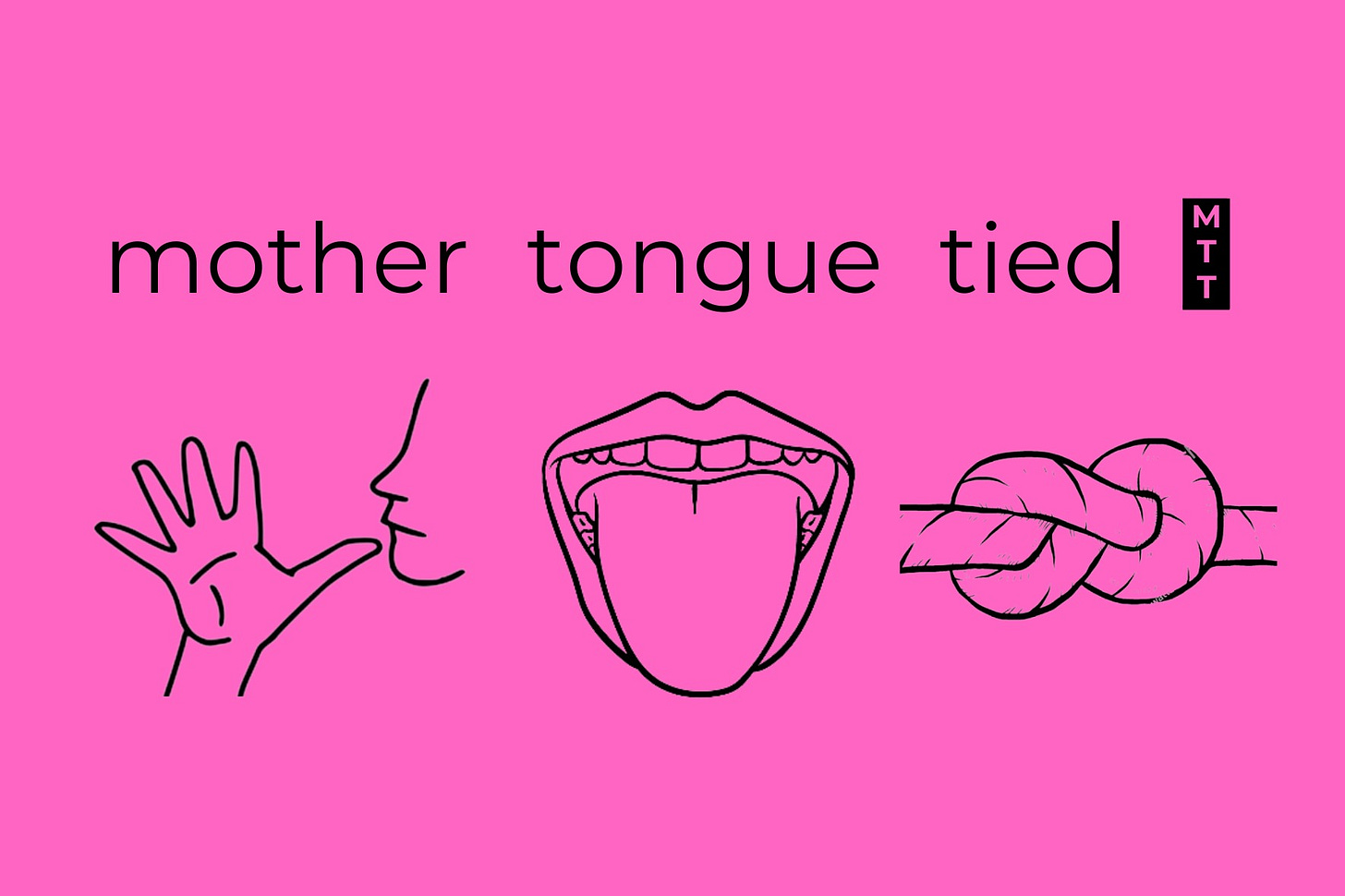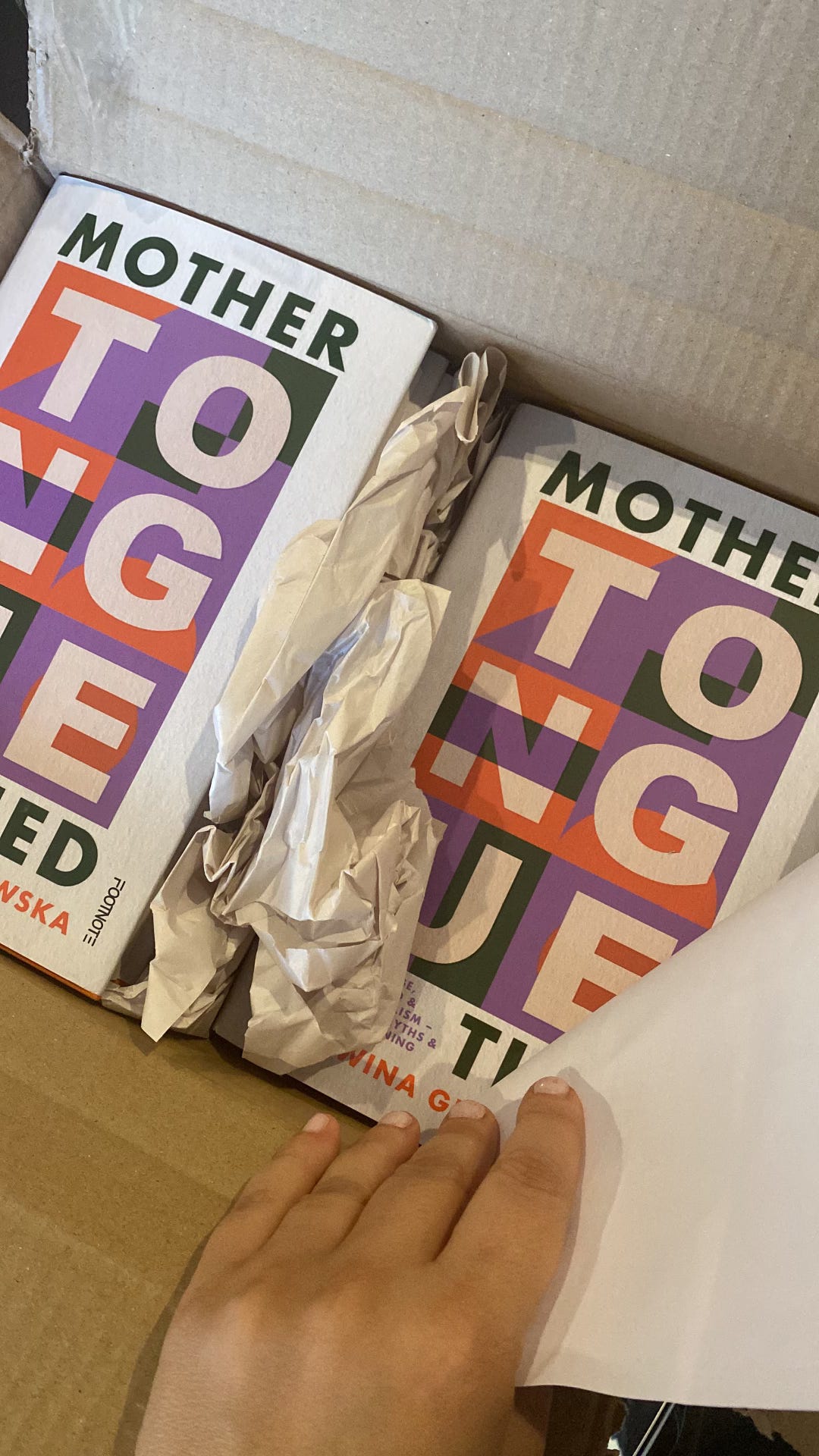10 Years of Multilingual Mothering
What I have learnt in the past decade of raising multilingual children. And some more book news because pub date is so close!
In just over a week, Mother Tongue Tied will be out in the world (most parts of the world that is, bear with me for more info on North America - fingers crossed soon). If you’d like to pre-order there is still time. Or pop into your local bookshop and get it there next week or request it from your local library. If you have a book club and are considering the book, I would love to hear about it. Anything and everything matter, and I am so grateful for all the support. I’ve posted a bit of this on social media already but here are a few things other authors, ones I admire so much, have said about the book:
"Edifying and enlivening"
― Kate Baer, 3x New York Times bestselling author of And Yet and What Kind of Woman
"A thought-provoking, political and empathetic book"
― Eliane Glaser, author of Motherhood: A Manifesto
"Gudowska writes with eloquence and tenderness from within the daily, sometimes heroic, often disheveled realities of multilingual mothering"
― Julie Sedivy, author of Memory Speaks: On Losing and Reclaiming Language and Self
"Gudowska has written the collection of research and story that she wishes had been by her side the whole time. Mothers with similar struggles will find validation and reassurance here."
― Gretchen McCulloch, New York Times bestselling author of Because Internet
I am also playing around with some merchandise because I love merch and it is a fun distraction. What do you think of this sticker design? This is the sign for mother/mom in ASL. I chose this version simply because it had a simple graphic but important to remember other sign languages, like BSL for example, have different signs for mother/mom because there are many different sign languages in the world. If you want a sticker, let me know, maybe I can do a giveaway or something fun with a little package of MTT merch!
And finally, before I get to the newsletter of the day, I must share my unboxing video. It is such a strange feeling to hold your book for the first time, I am still processing everything. Are these videos awkward or as the kids say (or maybe not?!) cringe? Of course! Would I do it all over again? Yes, yes, I would because like many authors, I have imagined this moment and life is short and book-writing is hard! I couldn’t embed for some reason but it is at the link above and here are some photos of the moment I first held the finished book:
On 10 Years of Multilingual Mothering
My firstborn turned 10 a couple of weeks ago. An entire decade of mothering behind me. How? But here we are. As I was scrolling multilingual parenting forums this morning, I came across a post from a woman in Canada trying to pass on Arabic to her 20-month-old daughter. She is the only input and exposure the child has now to Arabic as the father only speaks English and the child attends an English-French daycare. She was asking for advice and support.
To quote the mom: “I feel like I am not doing enough…some days I am so tired and just want to give up…I know I will regret it one day I am not able to share a conversation with her in Arabic...”
No matter how many times I read and hear these types of sentiments (a lot!), I get a pang in my heart and want to hug these moms. I remember these feelings so well when my son was a toddler. Truthfully, although in different ways, I still feel them today. One thing that often helps me with any sort of motherhood confusion is looking to caregivers with older children and what we can learn from their experiences or at least take some comfort in knowing it will be OK and so many things happen along the way. In honour of 10 years of multilingual mothering, here is a short list of things I have learnt, things I am still learning and hopefully some words of comfort to those in the trenches of multilingual toddlerhood.
1. When my son was also about 20 months old, I wrote an article for a Canadian newspaper on raising a multilingual toddler. I wrote:
“It is an anxiety-ridden, often soul-crushing, arduous feat not for the faint of heart. There are monumental highs and colossal lows, tears, frustrations and small victories that would, to an outsider, seem inconsequential, but are everything to me. There are also harsh defeats after so much effort that often leave me feeling spent.”
I still feel a lot of these feelings more than eight years later but maybe in a different way. There are still highs and lows, but they pass quicker, and I pick myself up faster from any feelings of defeat.
2. It is OK to be the language police, or not. I have always struggled with getting the balance right of wanting to encourage my children’s bilingualism while allowing them to come to it on their own. No, unfortunately, children will not become bilingual just by hearing a language and not engaging with it so there must be some sort of “policing” or put lightly, influence. But I am better at balance now. Sometimes I remind gently, other times sternly and both are OK.
3. It is fine to change the way you use languages with your children, even daily. Some days, I feel we haven’t spoken, engaged or read in Polish enough and English has stolen the day. But then, I try to figure out other ways to get some Polish input the next day or the day after. Some days, I ask my children to repeat things in Polish and other times, I let the conversation flow using a mix of languages.
4. As they grow and as their languages expand, children will surprise you in the most beautiful and poetic ways with a saying they learnt somewhere outside the home, a word you have never used before, in either or any language, and for a moment it is perfection.
5. Teaching my children to read in their non-dominant language was one of the best things I ever did. This is not always possible so if you can’t do this, do not beat yourself up (really, let’s not beat ourselves up ever over anything). But there are studies that show second-language literacy helps a lot with multilingualism. Do my son and I often go head-to-head when I ask him to read five pages of a Polish book out loud? Yes, of course. But in this case, the policing is worth it for me.
6. As I have written before and write in the book, a mother alone cannot either save or kill a language! The systems working around us play a huge role in how we mother in one or multiple languages. The institution of motherhood sucks and without societal support, caregiving continues to be an uphill battle for so many people. The same goes for raising multilingual children.
7. On that note, for a while my children did online Polish classes with a teacher in Poland and that helped. Now, it’s mostly media in Polish (almost only in Polish), reading and trying to visit family and friends who speak Polish with them. We also try to connect languages to things my children like. For example, we talk a lot about nationality, culture, language in the context of football players with my football-obsessed son. Everyone needs support so find it where you can.
8. It is OK to be tired, defeated and want to give up. I have stopped fighting those feelings as much as I used to. It is still hard, but life is hard so do what you can. I try my best to embrace those feelings then try to shake them off and move on – too much self-help talk?!
9. Ultimately, you can only do so much and there are only so many hours in the day. I hope I have some years left of influencing my children’s multilingualism before they are off to live their own lives and I will try to do as much as I can but I always try to remember, my children are their own people with their own linguistic and multicultural identities.
10. And because we all sometimes need a reminder no matter who we are, how we mother, how many languages our children communicate in. You are enough!
Thank you for indulging in my nostalgic sappiness!








Hi! Is it possible to buy this book as an ebook? I’m in the USA :)